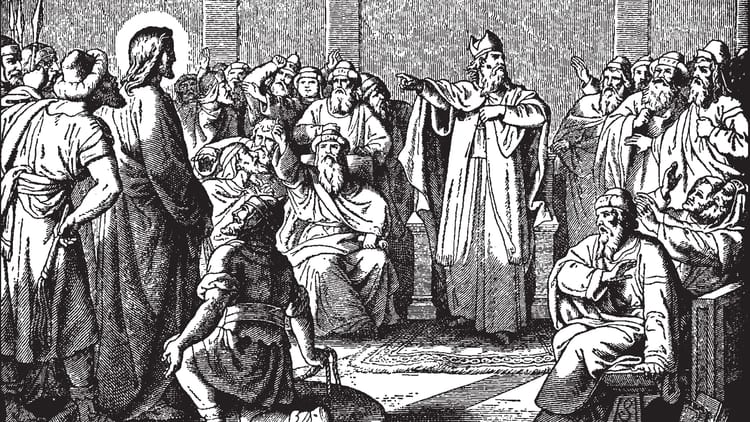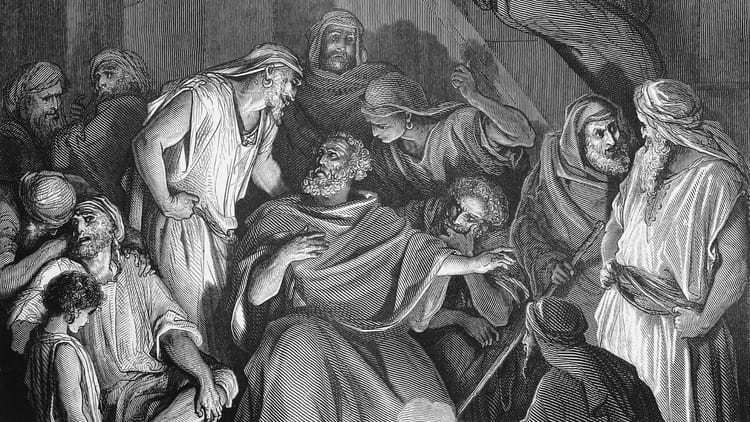The Death of Jesus (Mark 15:21-47)

At first glance, the death of Jesus looks like a horrible defeat. In the passage we just read, Jesus is alone and abandoned. Instead of defeating the Romans as the Messiah, he’s killed by the Romans. His own friends abandon him, and he’s surrounded by mockers and strangers. And he dies with a loud cry, and it’s over, and then he’s buried. Why would Christians celebrate this death? Why do we call this Good Friday?
But you’ll notice as you look at this passage that there’s more than meets the eye. Because in this passage Mark tells us, first, that history’s changed. Not only that, Mark tells us that our lives can change as well. Finally, Mark shows us, what took place at the cross is not a defeat; it’s actually something that’s worth celebrating.
First, History’s Changed
Let’s see how Mark shows us that history has changed by what takes place in this passage. In verse 33, right before Jesus died, we read: “At noon, darkness came over the whole land until three in the afternoon.”
This detail – the darkness – is so important that it’s mentioned by three of the four gospels. This couldn’t have been an eclipse. Why? For one thing, an eclipse only lasts for a few minutes. Passover – which is when Jesus died – took place during a full moon, and eclipses only take place when it’s a new moon. So this was no eclipse. Some people think it might have been a dust storm, but a dust storm would have been unlikely at this time because it was the wet season.
What Mark is telling us here is more than a weather report. Mark is showing us the significance of what happened. In the Bible, darkness means judgment. In Deuteronomy, God warned Israel:
However, if you do not obey the LORD your God and do not carefully follow all his commands and decrees I am giving you today, all these curses will come on you and overtake you…At midday you will grope about like a blind person in the dark. You will be unsuccessful in everything you do; day after day you will be oppressed and robbed, with no one to rescue you. (Deuteronomy 28:15, 29)
One of the Hebrew prophets foretold a day when God would judge the nation of Israel. Amos predicted that God would call his people to account for their injustice. He said:
“In that day,” declares the Sovereign LORD,
“I will make the sun go down at noon
and darken the earth in broad daylight.”
(Amos 8:9)
What Mark is saying is significant. We’re going to look at the other events that take place around the cross. You’re going to see that a lot is going on. But for three hours, the focus is not on any human activity, but on unnatural darkness. And it’s not a darkness that goes to midnight. It’s a darkness that ends at the death of Jesus. For three long hours, time passes as the death of Jesus takes place in unnatural darkness. Judgment. Isaac Watts wrote:
Well might the sun in darkness hide
And shut his glories in,
When Christ, the mighty Maker died,
For man the creature’s sin.
What’s going on at the cross? This isn’t simply somebody’s death. This is something far more than that. This is divine judgment. At the cross, Jesus bears the full weight of divine judgment for sins that we had done. God finally judges – but instead of judging those who had done wrong, God bears the judgment himself for all that we had done. As one person puts it, “Christianity is the only faith system where God both makes the demands and meets them” (Tullian Tchividjian). That’s what happened at the cross.
But there’s more. Verses 37 to 38 say: “With a loud cry, Jesus breathed his last. The curtain of the temple was torn in two from top to bottom.”
At the very moment that Jesus dies, something unbelievable happens. The curtain of the temple was torn in two from top to bottom. There were actually two curtains in the temple. One, the outer curtain, separated the sanctuary from the outer porch. The other was the inner veil that separated the Holy Place and the Most Holy Place. Only the high priest could enter in, and only once a year for a moment. The curtain was 60 feet high and 30 feet wide. We don’t know which curtain it was, but Hebrews identifies it as the inner curtain.
Therefore, brothers and sisters, since we have confidence to enter the Most Holy Place by the blood of Jesus, by a new and living way opened for us through the curtain, that is, his body… (Hebrews 10:19-20)
At the cross, Mark is saying, Jesus bore the judgment of God. And something happened at the temple which showed that the death of Jesus changed everything. At the cross, Jesus took the punishment for the sins we had committed. He experienced the judgment that should have been ours. At the death of Jesus, something happened that made the temple system of sacrifices and priests and all that it involved obsolete. This wasn’t just an ordinary death. History changed at the cross.
But it’s not just history that changed. Mark shows us something else in this passage. Here’s the second thing that Mark shows us:
Secondly, Mark says, Our lives can change as well.
Do you notice the motley crew of characters in this passage?
In verse 21, we meet Simon of Cyrene. He’s from North Africa. He stumbles upon the scene, and his family is changed as a result. Mark mentions his sons, Alexander and Rufus, presumably because his sons would have been familiar to the original recipients of Mark’s book. A stranger from Africa stumbles upon the scene, and it evidently transforms his family.
Then there are three big surprises. In verse 39 we read, “And when the centurion, who stood there in front of Jesus, saw how he died, he said, ‘Surely this man was the Son of God!'” The centurion in this passage would have observed the death of many crucified criminals. He’s the last person you would expect to be changed. But something about the way Jesus dies grabs him. He says that Jesus is the Son of God. The Romans called the emperor’s son the son of god. This soldier transfers the title of the most revered figure in the Roman imperial cult to a Jew who’s just been crucified. The first human witness to describe Jesus as the Son of God is not a disciple, not a Jew at all, but a Gentile army officer with no previous connection to Jesus. The disciples don’t get it; the religious leaders don’t get it; this Roman officer gets it. He may not have understood the full significance of what he said, but he gets that this is no ordinary insurrectionist. He understands that something more is going on. This is the true Son of God, who does not die in failure. He dies fulfilling his Father’s will.
Then there are the women. Verses 40-41 say:
Some women were watching from a distance. Among them were Mary Magdalene, Mary the mother of James the younger and of Joseph, and Salome. In Galilee these women had followed him and cared for his needs. Many other women who had come up with him to Jerusalem were also there.
What’s surprising about this? In all cultures at that time, women were viewed as inferior. Their testimony was not accepted. Up until this point, women had played a very minor role in the Gospel of Mark. Mark doesn’t mention any female disciples. But here, at the climax of the Gospel, the male disciples have deserted Jesus, and the women are still there, faithful to the last. They are the witnesses of all that takes place. They are the ones that saw Jesus die; they saw his body being laid in the tomb; they are the ones who find the tomb empty. They are the only eyewitnesses of the death, burial, and resurrection of Jesus. God entrusts the message of the resurrection to them. This is one evidence, by the way, of the accuracy of the Gospels. If you were making a story up, you would never invent that women are the first eyewitnesses. You’d only write that if it were true.
Do you see what Mark is showing us? The death of Jesus is turning everything upside-down. It’s changing families of a random person walking by; a Roman soldier becomes the first to grasp something of who Jesus is at the cross; women who are normally excluded are brought into the very center, and become eyewitnesses of the greatest event in redemptive history.
There’s one more person who’s changed in this passage. We read in verses 43: “Joseph of Arimathea, a prominent member of the Council, who was himself waiting for the kingdom of God, went boldly to Pilate and asked for Jesus’ body.” Joseph, Mark says, is a prominent member of the Council, the Sanhedrin – the group that has just condemned Jesus. He has significant social standing in Jerusalem. And yet he risks his life here by going to Pilate and asking for the body of Jesus. Romans usually left bodies hanging on the cross until they decayed as a warning to other would-be rebels and slaves. And yet Joseph puts his reputation and life at risk by asking for Jesus’ body. And even more shockingly, he prepares the body for burial himself. Preparing a crucified corpse for burial would have been an unthinkable task, certainly well below what a man like Joseph would ever do. It was a job that was usually left for those much lower than him.
Do you see what Mark is showing us in this passage? What happened at the cross changed history. At the cross, Jesus bore God’s judgment, and he made a new way for us to approach God. But it didn’t just change history. It changed people. At the cross, the death of Jesus changed the lives of the most unusual people, people who would otherwise have nothing in common. It’s still changing the most unlikely people: people from all different nationalities; people who are religious and people how aren’t; people who are prominent and powerful and people who aren’t. The death of Jesus changes history, and it changes lives as well.
There’s one more thing Mark wants to show us.
The death of Jesus is not a defeat; it’s a victory worth celebrating.
In this passage, Jesus is remarkably silent. Mark records only two times that Jesus says anything. As he dies, Mark says in verse 37, he lets out a loud cry. And in verse 34 he cries, “My God, my God, why have you forsaken me?”
What is this about? At first glance it looks like the desperate cry of someone who’s been completely abandoned by God. It is that, but it’s actually much more.
If you study the gospels carefully, you’ll notice that this is the only time that Jesus addresses God as “My God.” Every other time that Jesus refers to God, he calls him Father. Jesus addresses God not in terms of the intimate relationship he enjoyed with God as his Son; he addresses God at a distance. And his cry, “Why have you forsaken me?” gets to the heart of what happened at the cross. On the cross, Jesus is experiencing the immense pain of divine abandonment. Centuries before, the prophet of Isaiah wrote:
Surely the arm of the LORD is not too short to save,
nor his ear too dull to hear.
But your iniquities have separated
you from your God;
your sins have hidden his face from you,
so that he will not hear.
(Isaiah 59:1-2)
Isaiah says that our sins have separated us from our God. The Bible teaches that God’s eyes “are too pure to look on evil; you cannot tolerate wrongdoing” (Habakkuk 1:13). On the cross, all of our sins were poured on Jesus. When he took on the sins of the world, “he became the most grotesque, most obscene mass of sin in the history of the world” (R.C. Sproul). And at that moment, it was as if God turned his back on Jesus. He hung in the cross, in a sense cut off from the relationship he had enjoyed with his Father throughout eternity. Phil Ryken put it this way:
It was as if God had taken a giant bucket and scooped up all the sins of his people – all the jealousy and the lying, all the rebellion and the stealing and the incest, all the hypocrisy and the envy and the swearing – and dumped them all out on Jesus Christ. “The LORD has laid on him the iniquity of us all” (Isaiah 53:6). “God made him who had no sin to be sin for us…” (2 Corinthians 5:21).
Once he had done that, God the Father had to forsake all that sin. When Jesus was wearing our sin on the cross, God the Father could not bear to look at the sin or at his Son. He had to avert his gave. He had to shield his eyes. He had to turn his back. He had to condemn and reject and curse and damn that sin…When Jesus Christ picked up our sins, he became a curse for us, and when he became a curse for us, he was accursed by God. God was not forsaking his Son as much as he was forsaking the sin the Son was carrying.
I said this was good news. So far I haven’t told you how this is good news, have I? It’s good news in two ways. First: “The forsaking of the Son of God on the cross is a fearful thing, but it’s good news for sinners who repent” (Phil Ryken). Why is it good news? Jesus was forsaken so that we don’t have to be forsaken. He was rejected so that we can be accepted. At the cross, he was cut off from God so that we could be brought in.
It’s also good news because of where Jesus got this prayer: “My God, my God, why have you forsaken me?” Jesus is actually quoting Psalm 22. Psalm 22 is the prayer of someone who is being attacked, someone who feels abandoned by God. When Jews quoted the Hebrew Scriptures back then, quoting one verse would be enough to bring up the whole passage. So many of those hearing Jesus quote Psalm 22:1 would have remembered how Psalm 22 ends: it ends with vindication. It begins like this:
My God, my God, why have you forsaken me?
Why are you so far from saving me,
so far from the words of my groaning?
(Psalm 22:1)
But it ends like this:
For he has not despised or scorned
the suffering of the afflicted one;
he has not hidden his face from him
but has listened to his cry for help.
(Psalm 22:24)
Jesus is saying that he knows the abandonment is not the end of the story. God will vindicate him. There’s more:
All the ends of the earth
will remember and turn to the LORD,
and all the families of the nations
will bow down before him…
(Psalm 22:27)
As Jesus goes to the cross, there’s more than meets the eye. At the cross, history changed. Not only that, but lives were changed. At the cross, Jesus was cut off from God so that we wouldn’t have to be cut off. Because God did not reject him forever, neither will God reject us when we place our faith in Christ and understood what he did for us at the cross.
So help us see beneath the surface, Father. Thank you that on that Friday long ago, history changed. Thank you, though, that it’s not just history that changed. For two thousand years now, you’ve been changing lives because of what Jesus accomplished at the cross. He bore our sins; he received what we deserved.
Help us see the cross. And I pray it would change us today. We pray in the name of the one who was rejected, so we could be accepted, in the name of the one who gave his life so that we could live. In the name of Jesus we pray. Amen.





